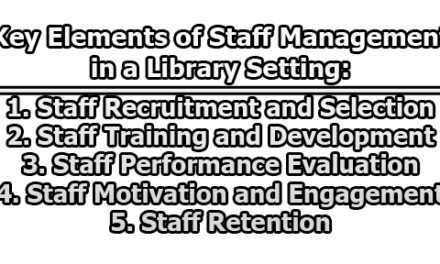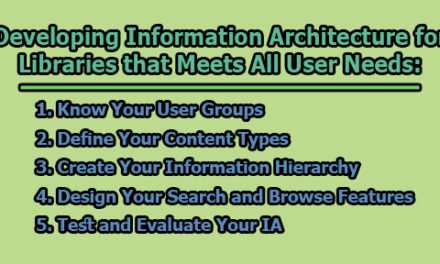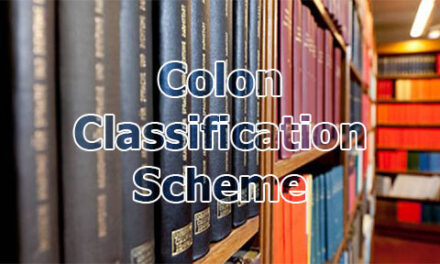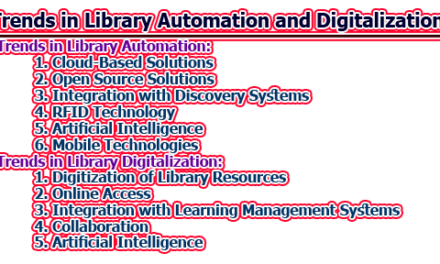Goals and Objectives of Library User Education:
Library user education is a vital component of modern library services, aimed at equipping patrons with the necessary skills and knowledge to effectively utilize library resources. In today’s information-rich world, libraries are not just repositories of books; they are gateways to a vast digital landscape. To navigate this landscape effectively, library users must receive an education that goes beyond traditional reading and borrowing. This article delves into the goals and objectives of library user education, highlighting its significance in promoting information literacy and lifelong learning.
Goals of Library User Education:
Library user education, often referred to as information literacy instruction or library instruction, plays a pivotal role in empowering individuals to navigate the increasingly complex information landscape. Here, we explore the multifaceted goals of library user education, emphasizing their significance in fostering information literacy, critical thinking, and lifelong learning (Association of College & Research Libraries, 2000).
Goal 1: Promoting Information Literacy: The primary and overarching goal of library user education is to promote information literacy among library users. Information literacy is a multifaceted skill set that empowers individuals to recognize when information is needed, locate and access relevant information, evaluate the credibility and quality of sources, and use information effectively to solve problems or make informed decisions (American Library Association, 1989). This goal underpins all other objectives of library user education.
Goal 2: Enhancing Research Skills: Library user education aims to equip individuals with robust research skills. This includes developing an understanding of the research process, formulating effective research questions, crafting search strategies, and navigating diverse information sources, including library catalogs, databases, and online repositories (Association of College & Research Libraries, 2016).
Goal 3: Encouraging Critical Thinking: Critical thinking is an integral part of information literacy, and library user education actively cultivates this essential skill. Patrons learn to critically evaluate information sources, assessing them for bias, accuracy, relevance, and authority (Association of College & Research Libraries, 2016). This ability to think critically extends beyond library resources and is applicable to information encountered in everyday life.
Goal 4: Supporting Academic Success: In academic settings, library user education is a cornerstone of academic success. Students benefit significantly from instruction that helps them develop the skills necessary for locating, evaluating, and citing academic sources, which are indispensable for research papers, essays, and other academic assignments (Association of College & Research Libraries, 2016).
Goal 5: Promoting Digital Literacy: With the increasing reliance on digital resources and technologies, library user education includes a strong emphasis on digital literacy. This encompasses teaching patrons how to effectively and ethically use computers, software, online databases, and electronic resources (Martin, 2007). Digital literacy is crucial for success in both academic and professional contexts.
Goal 6: Cultivating Lifelong Learning: Libraries serve as catalysts for lifelong learning. Library user education encourages individuals to cultivate a passion for learning that extends beyond formal education (UNESCO, 2016). Patrons are empowered to continue seeking knowledge throughout their lives, whether for personal enrichment, career advancement, or addressing evolving societal challenges.
Goal 7: Enhancing Media Literacy: In the contemporary digital age, media literacy is a critical skill. Library user education may include teaching users how to critically evaluate and analyze media sources, including news articles, social media content, and multimedia materials, to distinguish factual information from misinformation, propaganda, or biased narratives.
Goal 8: Fostering Ethical Information Use: Ethical information use is a fundamental aspect of library user education. Patrons learn the importance of ethical practices, including proper citation and referencing to avoid plagiarism, as well as respecting copyright laws and intellectual property rights (American Library Association, 2015).
Goal 9: Increasing Library Awareness: A fundamental goal is to raise awareness among library users regarding the comprehensive range of resources and services offered by the library (American Library Association, 2004). This includes physical collections, digital resources, interlibrary loan services, research assistance, and specialized programs or events.
Goal 10: Promoting Inclusivity and Diversity: Library user education strives to promote inclusivity and diversity by assisting users in accessing a wide range of perspectives, cultures, and voices through library resources (American Library Association, 2017). It encourages open-mindedness, cultural competence, and the appreciation of diverse viewpoints.
Objectives of Library User Education:
Library user education, also known as information literacy instruction or library instruction, involves specific objectives aimed at equipping individuals with the skills and knowledge required to navigate library resources effectively and become information literate. These objectives are designed to help library users access, evaluate, and use information resources efficiently. Here, we’ll explore the key objectives of library user education:
Objective 1: Information Retrieval Skills: One of the primary objectives of library user education is to teach individuals how to retrieve information effectively. This includes:
- Developing search strategies.
- Utilizing library catalogs, databases, and online search engines.
- Using advanced search techniques, such as Boolean operators and truncation.
These skills enable users to locate relevant materials efficiently (Martin, 2007).
Objective 2: Critical Evaluation: Library user education aims to foster critical thinking by teaching users how to evaluate information sources. This objective involves:
- Assessing the credibility and reliability of sources.
- Identifying bias and potential inaccuracies.
- Evaluating the relevance of information to their needs (Association of College & Research Libraries, 2016).
Objective 3: Effective Use of Resources: Users are guided on how to use a variety of resources effectively:
- Learning how to navigate physical and digital collections.
- Understanding the organization of libraries and digital repositories.
- Utilizing various formats, including books, journals, databases, and multimedia resources (American Library Association, 1989).
Objective 4: Ethical Information Use: Promoting ethical information use is a crucial objective:
- Teaching proper citation and referencing styles.
- Raising awareness of plagiarism and how to avoid it.
- Encouraging respect for copyright laws and intellectual property rights (American Library Association, 2015).
Objective 5: Digital Literacy: In the digital age, digital literacy is essential. Library user education includes:
- Teaching users how to use computers, software, and digital devices.
- Navigating electronic resources and databases.
- Promoting online safety and digital citizenship (American Library Association, 2013).
Objective 6: Lifelong Learning: One of the core objectives of library user education is to cultivate a love for lifelong learning. This involves:
- Encouraging users to explore topics beyond their immediate needs.
- Providing resources for personal enrichment.
- Promoting self-directed learning (UNESCO, 2016).
Objective 7: Academic Success: For students, achieving academic success is vital. Library user education supports this by:
- Teaching research skills for academic assignments.
- Guiding students in using academic databases and citation styles.
- Enhancing information literacy to succeed academically (Association of College & Research Libraries, 2016).
Objective 8: Media Literacy: In an era of vast media consumption, library user education may aim to enhance media literacy by:
- Teaching users how to critically evaluate news articles, websites, and social media content.
- Recognizing misinformation, bias, and propaganda.
- Navigating multimedia resources effectively (Hobbs, 2010).
Objective 9: Inclusivity and Diversity: Promoting inclusivity and diversity is an increasingly important objective:
- Ensuring access to diverse perspectives and cultural resources.
- Raising awareness of diverse voices in the library collection.
- Encouraging cultural competence and open-mindedness (American Library Association, 2017).
Objective 10: Library Awareness: Finally, library user education seeks to increase awareness of library resources and services, including:
- Promoting knowledge of library policies and procedures.
- Introducing users to specialized services like interlibrary loans, reference assistance, and workshops.
- Creating informed and engaged library patrons (American Library Association, 2004).
In conclusion, Library user education plays a pivotal role in equipping individuals with the skills and knowledge needed to thrive in the information age. Its goals revolve around promoting information and digital literacy, encouraging lifelong learning, and supporting academic success. The objectives range from teaching information retrieval skills to fostering ethical information use and nurturing a reading culture. As libraries continue to evolve in the digital era, the significance of library user education cannot be overstated. It empowers individuals to be discerning, informed, and engaged members of society.
References:
- American Library Association. (1989). Presidential Committee on Information Literacy: Final Report. Retrieved from https://files.eric.ed.gov/fulltext/ED315279.pdf
- American Library Association. (2004). Information Literacy: A Position Paper by the Library Association.
- American Library Association. (2013). Digital Literacy, Libraries, and Public Policy.
- American Library Association. (2015). Information Literacy Competency Standards for Higher Education. Retrieved from http://www.ala.org/acrl/standards/ilframework
- American Library Association. (2017). Diversity Standards: Cultural Competency for Academic Libraries. Retrieved from http://www.ala.org/acrl/standards/diversity
- Association of College & Research Libraries. (2000). Information Literacy Competency Standards for Higher Education. Retrieved from http://www.ala.org/acrl/standards/informationliteracycompetency
- Association of College & Research Libraries. (2016). Framework for Information Literacy for Higher Education.
- Association of College & Research Libraries. (2016). Information Literacy Competency Standards for Higher Education.
- Hobbs, R. (2010). Digital and media literacy: A plan of action. The Aspen Institute.
- Martin, A. (2007). Digital Literacy and the ‘digital society’. Digital literacies: Concepts, policies, and practices, 151-176.
- (2016). Education 2030: Incheon Declaration and Framework for Action. Retrieved from https://unesdoc.unesco.org/ark:/48223/pf0000245656

Library Lecturer at Nurul Amin Degree College










